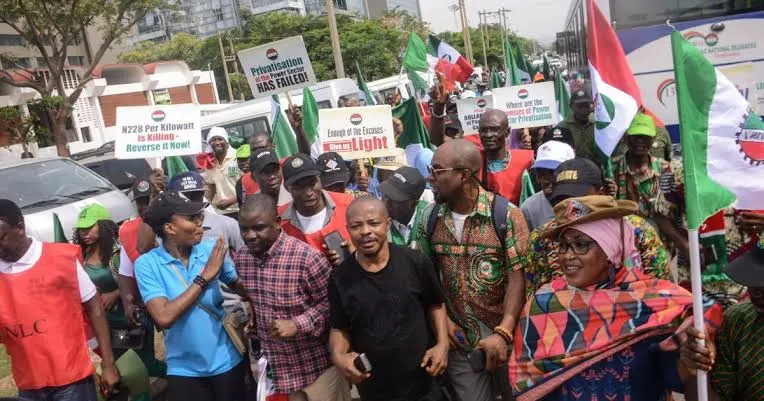Nigeria is bracing for significant disruptions as various unions have joined the Nigeria Labour Congress (NLC) and the Trade Union Congress (TUC) in an indefinite nationwide strike. This collective action comes in response to the Federal Government’s refusal to raise the proposed minimum wage from N60,000 and its failure to reverse the recent hike in electricity tariffs to N65/kWh. The strike is set to commence at midnight on Sunday, June 2, 2024.
The decision to strike was officially announced on Friday, with NLC President Joe Ajaero and TUC counterpart Festus Osifo expressing their disappointment over the government’s inability to finalize and pass a new National Minimum Wage Act into law. The unions had initially given the government a deadline of May 31, 2024, to negotiate a new minimum wage. However, negotiations broke down after the government increased its initial offer from N57,000 to N60,000, which was still deemed insufficient by the labor unions.

In a significant show of solidarity, a wide array of unions across various sectors have pledged their support for the strike. These unions represent critical industries, including education, aviation, electricity, finance, and healthcare, underscoring the broad impact of the government’s failure to address the demands for fair wages and reasonable electricity tariffs.
Unions Joining the Strike and Their Implications
- Academic Staff Union of Universities (ASUU): Lecturers across Nigerian universities will halt their academic duties, disrupting higher education and affecting millions of students nationwide.
- Maritime Workers’ Union of Nigeria: This will impact port operations, affecting imports and exports and likely causing delays and financial losses in international trade.
- National Union of Electricity Employees (NUEE): Power generation and distribution may be severely disrupted, leading to widespread power outages and further economic hardships.
- National Union of Banks, Insurance and Financial Institutions Employees (NUBIFIE): Banking and financial services will be disrupted, affecting transactions, business operations, and economic stability.
- Judiciary Staff Union of Nigeria (JUSUN): Court operations will be halted, delaying legal proceedings and access to justice.
- Nigeria Union of Teachers (NUT): Primary and secondary education will be affected, with schools likely closing and disrupting the education of young students.
- National Associations of Nigeria Nurses and Midwives (NANNM): Healthcare services will be severely impacted, compromising patient care and public health.
- Joint Health Sector Unions (JOHESU): Healthcare services across hospitals and clinics will be disrupted, affecting medical care and emergency services.
- National Union of Petroleum and Natural Gas (NUPENG): Oil and gas production and distribution will be affected, potentially leading to fuel shortages and increased fuel prices.
- National Union of Air Transport Employees (NUATE) and Air Transport Services Senior Staff Association of Nigeria (ATSSSAN): Aviation services will be withdrawn, grounding flights and disrupting air travel and cargo transport.
- Senior Staff Association of Nigerian Universities (SSANU): Administrative functions in universities will be halted, affecting university management and operations.
- Nigeria Union of Journalists (NUJ): Media coverage and news dissemination may be impacted, affecting public access to information.
- National Union of Petroleum and Natural Gas (NUPENG): The involvement of NUPENG in the strike could lead to disruptions in the production, refining, and distribution of petroleum products. This may result in fuel shortages, impacting transportation, industries, and essential services reliant on petrol and natural gas.
- Nigeria Union of Railway Workers: The participation of railway workers could disrupt railway operations, leading to delays in passenger and freight transportation. This could affect logistics, trade activities, and connectivity between cities and regions served by the railway network.
- Nigeria Civil Service Union: The involvement of civil servants could disrupt government services and administrative functions at various levels. This may lead to delays in public services, bureaucratic processes, and government operations, affecting citizens’ access to essential services and administrative efficiency.
- Association of Nigeria Aviation Professionals: The participation of aviation professionals could ground flight operations, leading to flight cancellations, disruptions in passenger travel, and cargo logistics. This will impact air travel, tourism, and trade activities reliant on aviation services.
- Academic Staff Union of Colleges of Agriculture: The participation of academic staff in agricultural colleges could disrupt teaching, research, and extension services in the agricultural sector. This may hinder agricultural education, innovation, and knowledge dissemination critical for sustainable farming practices and food security.
- Senior Staff Association of Nigerian Universities: The involvement of university staff could disrupt academic and administrative functions in higher education institutions. This may lead to the suspension of teaching, research, and other institutional activities, affecting students’ academic progress and institutional operations.
- Senior Staff Association of Statutory Corporations and Government-Owned Companies: The participation of staff in statutory corporations and government-owned companies could disrupt operations in key public-sector entities. This may impact service delivery, infrastructure development, and government projects, affecting public services and governance.
- Petroleum and Natural Gas Senior Staff Association of Nigeria (PENGASSAN): The involvement of PENGASSAN members could lead to disruptions in oil and gas operations, affecting production, refining, and distribution activities. This may result in fuel shortages, impacting industries, transportation, and essential services reliant on petroleum products.
- Nigerian Union of Journalists (NUJ): The participation of journalists could affect media coverage, news dissemination, and press freedom. This may impact public access to information, transparency, and accountability, affecting democracy and governance in the country.
- Senior Staff Association of Nigeria Polytechnic: The involvement of polytechnic staff could disrupt academic and administrative functions in polytechnics. This may lead to the suspension of teaching, training, and other institutional activities, affecting students’ education and skill development.
- National Union of Food, Beverage and Tobacco Employees: The participation of workers in the food, beverage, and tobacco industry could disrupt production, manufacturing, and distribution activities. This may lead to shortages of essential goods, impacting consumers, retailers, and the economy.
- Nigeria Union of Local Government Employees: The involvement of local government employees could disrupt local governance and service delivery at the grassroots level. This may lead to delays in public services, infrastructure development, and community projects, affecting citizens’ welfare and local development.
- Iron and Steel Senior Staff Association of Nigeria: The participation of iron and steel industry workers could disrupt production, manufacturing, and supply chain activities. This may lead to shortages of raw materials, impacting industries reliant on iron and steel products for manufacturing and construction.
- National Union of Air Transport Employees (NUATE) and Air Transport Services Senior Staff Association of Nigeria (ATSSSAN): The involvement of air transport employees could ground flight operations, leading to disruptions in passenger travel and cargo logistics. This will impact air travel, tourism, and trade activities reliant on aviation services.
- National Association of Aircraft Pilots and Engineers: The participation of aircraft pilots and engineers could affect flight operations, safety standards, and maintenance activities in the aviation sector. This may impact aviation safety, passenger confidence, and industry regulations.
- National Union of Postal and Telecommunication Employees: The involvement of postal and telecommunication workers could disrupt mail delivery, telecommunications services, and internet connectivity. This may lead to delays in communications, financial transactions, and online services, affecting businesses and individuals reliant on postal and telecom services.
- Parliamentary Staff Association of Nigeria: The participation of parliamentary staff could disrupt legislative proceedings and administrative functions in the National Assembly and state legislatures. This may lead to delays in lawmaking, policy formulation, and governance activities, affecting democratic processes and public policy implementation.
- Senior Staff Association of Universities, Teaching Hospitals, Research Institutes and Associated Institutions: The involvement of staff in universities, teaching hospitals, and research institutes could disrupt academic, healthcare, and research activities. This may lead to the suspension of teaching, medical services, and scientific research, affecting students, patients, and the advancement of knowledge.
- The Parliamentary Staff Association of Nigeria: The participation of parliamentary staff could disrupt administrative functions and support services in the National Assembly and state legislatures. This may lead to delays in legislative processes, parliamentary sessions, and constituency services, affecting democratic governance and representation.

The participation of these unions in the strike highlights the widespread dissatisfaction with the government’s policies and the urgent need for economic reforms. The disruption across various sectors will likely have a ripple effect on the national economy, leading to significant financial losses, inconveniences, and potential social unrest. The government’s handling of this crisis will be closely watched, as it could have lasting implications for labor relations, economic stability, and public trust in the administration.
The strike underscores the critical role of fair wages and affordable utilities in ensuring the well-being of the workforce and the overall stability of the country. As Nigeria navigates this challenging period, the resolution of these issues will be pivotal in shaping the nation’s economic future and social harmony.
Sources
- https://punchng.com/full-list-asuu-tcn-banks-others-join-nlc-nationwide-strike/
- https://punchng.com/just-in-asuu-joins-nlc-tuc-nationwide-strike/
- https://www.nairaland.com/8113176/full-list-asuu-tcn-banks
- https://www.premiumtimesng.com/news/top-news/700601-minimum-wage-nigerian-govt-urges-nlc-tuc-to-halt-strike-continue-negotiation.html#:~:text=The%20NLC%20and%20TUC%20began,minimum%20wage%20for%20Nigerian%20workers.




